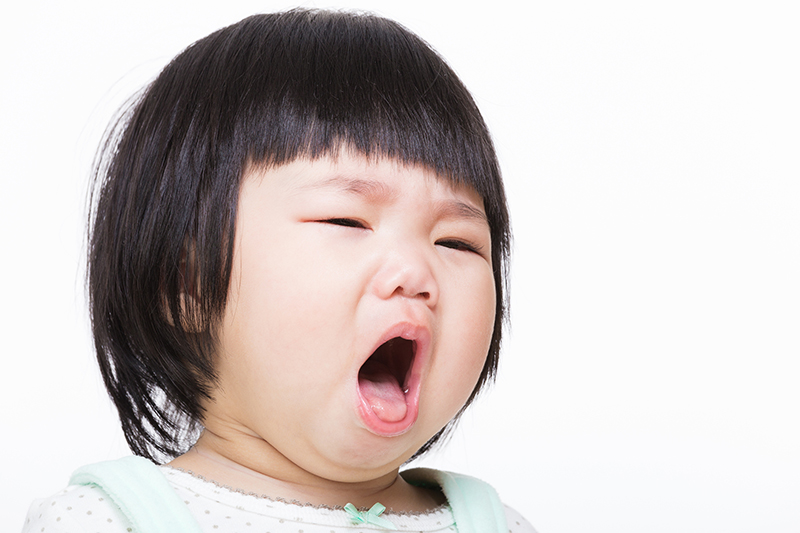Families For Life | Cough-Newborn

Lots of children get coughs, and their coughs tend to hang around. A cough can be upsetting for your child - and for you too! - but most coughs don't need any special treatment.
Causes of cough
There are many causes of coughs in children, including:
viral respiratory tract infections, like colds and flus
bacterial respiratory tract infections, but these are rare
irritations, like cold air, smoke, pollution or an inhaled foreign object
allergies and asthma
psychological reasons – for example, a habit cough.
By far the most common cause of coughing is a viral infection, when the cough usually happens as part of a cold. Young children can get 6-12 colds a year.
The next most common cause of coughing is asthma.
Other causes of a cough are relatively uncommon.
Cough symptoms
Your child’s cough and any other symptoms will vary according to the cause of the cough.
A cough that follows a cold will typically be loose and sometimes produce mucus. It’s often worse at night. This is because when your child lies down, mucus drips from the back of her nose and mouth into her windpipe. The cough might last for up to six weeks after the other symptoms of the cold have disappeared.
An asthma cough is often worse at night and after exercise. Your child might also have a wheeze and breathing difficulties like shortness of breath.
A barking, hoarse cough could mean that your child has croup.
If your child starts coughing suddenly and also wheezing following a choking episode, he might have inhaled a foreign object.
If your child has had a very heavy cold and then gets bouts of coughing for many weeks afterwards, which sounds like barking when she breathes out and ‘whooping’ when she breathes in, it might be whooping cough.
If your child is less than 12 months old and has a cough as well as breathing difficulties, it might be bronchiolitis.
In an older child or teenage child, a cough might become a habit. Usually these coughs are ‘honking’ coughs and don’t happen when the child is asleep.
When to see your General Practitioner (GP) about a cough
If your child has one or more of the following symptoms, you should take him to see the GP:
The cough goes on for longer than two weeks with or without a cold.
The cough starts suddenly.
The cough is interfering a lot with your child’s sleep or daily life.
Your child has any difficulty with breathing.
Your child has a high fever.
Your child’s skin changes colour, and turns blue or very pale.
In most cases, your child won’t need to see the GP if she’s otherwise well except for her cough.
Tests for cough
Most children with coughs don’t need any tests.
A GP can usually work out the cause of the cough by taking a careful history of your child’s cough and any other symptoms, and also by examining your child.
The doctor might order a chest X-ray if your child has pneumonia or to make sure your child hasn’t inhaled something.
A blood test might help doctors work out whether there’s a serious infection present.
Treatment for cough
The most common cough is the one that follows a cold, and it doesn’t need any special treatment. This kind of cough is probably caused by the irritation in your child’s respiratory tract, rather than an infection.
Most children don’t need antibiotics for a cough. This is because a virus caused the original infection, and antibiotics treat only bacterial infections.
If your child’s cough is caused by asthma, it can be treated with anti-asthma medication like a Ventolin® puffer with a spacer, but this treatment depends on your child’s symptoms and the age of your child.
Tobacco smoke can make your child’s cough worse, so keep your home smoke-free.
Cough medicines and expectorants (medicines that are supposed to help you cough up mucus from your lungs and airways) don’t make any difference to a cough.
Vaporisers and humidifiers don’t make coughing better. Also, young children might accidentally swallow the vaporiser solution (usually containing menthol or eucalyptus) or burn themselves.
Honey might reduce how bad a cough is and how long it lasts. But you shouldn’t give honey to children younger than 12 months because of the risk of infantile botulism, a rare but serious form of food poisoning.
Usually a cough following a cold will improve with time, no matter how you treat it.
Cough prevention
If your child’s cough is caused by asthma, you can usually prevent it with appropriate treatment.
You can minimise the risk of inhaling foreign objects by not letting toddlers and infants eat whole nuts or play with small objects that they can easily inhale.
Your child and family can also take simple precautions to prevent the spread of infections that cause coughs:
Wash your hands regularly with warm, soapy water.
Keep your hands away from your face as much as possible.
Cough or sneeze into a tissue or your elbow.
© raisingchildren.net.au, translated and adapted with permission
Explore more